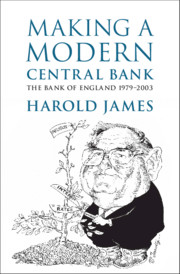Book contents
- Making a Modern Central Bank
- Studies in Macroeconomic History
- Making a Modern Central Bank
- Copyright page
- Dedication
- Contents
- Figures
- Tables
- Acknowledgements
- Abbreviations
- 1 Introductory
- 2 Foreign Fetters
- 3 The Performance of the UK Economy
- 4 The Inexplicable in Pursuit of the Uncontrollable
- 5 ‘A Good Deal of Advice’
- 6 The Long Shadow of the Deutschemark
- 7 Hong Kong
- 8 Shaved Eyebrows
- 9 Tunnelling Deep
- 10 Great Leap in the Dark
- 11 The Spine Theory and Its Collapse
- 12 ‘You Can’t Be In and Out at the Same Time’:
- 13 Horses for Courses
- 14 Failure of Internal Communication
- 15 The New Bank
- 16 Epilogue
- Book part
- Notes
- Bibliography
- Index
2 - Foreign Fetters
Published online by Cambridge University Press: 18 September 2020
- Making a Modern Central Bank
- Studies in Macroeconomic History
- Making a Modern Central Bank
- Copyright page
- Dedication
- Contents
- Figures
- Tables
- Acknowledgements
- Abbreviations
- 1 Introductory
- 2 Foreign Fetters
- 3 The Performance of the UK Economy
- 4 The Inexplicable in Pursuit of the Uncontrollable
- 5 ‘A Good Deal of Advice’
- 6 The Long Shadow of the Deutschemark
- 7 Hong Kong
- 8 Shaved Eyebrows
- 9 Tunnelling Deep
- 10 Great Leap in the Dark
- 11 The Spine Theory and Its Collapse
- 12 ‘You Can’t Be In and Out at the Same Time’:
- 13 Horses for Courses
- 14 Failure of Internal Communication
- 15 The New Bank
- 16 Epilogue
- Book part
- Notes
- Bibliography
- Index
Summary
In 1976 UK economic policy making and fiscal strategy was transformed as a result of an exchange rate crisis that brought in the International Monetary Fund. Monetary targeting began to be a theme of policy debate. A central part of the pre-1979 influence and effective power of the Bank of England rested on the fact that the British domestic financial market was self-contained or cut off from the rest of the world, through the use of capital and exchange controls, applied to UK residents (corporations and individuals) but not to international holders of sterling. In 1976, as part of the IMF rescue package, exchange controls had been tightened, with a prohibition of use of sterling in trade financing that did not involve the UK. The incoming Conservative government started with a partial decontrol in July 1979, when restrictions on direct overseas investments were removed, and portfolio investment also became easier. In October 1979 exchange controls were completely abolished, a move which challenged the Bank of England’s control of the money supply.
- Type
- Chapter
- Information
- Making a Modern Central BankThe Bank of England 1979–2003, pp. 32 - 42Publisher: Cambridge University PressPrint publication year: 2020

